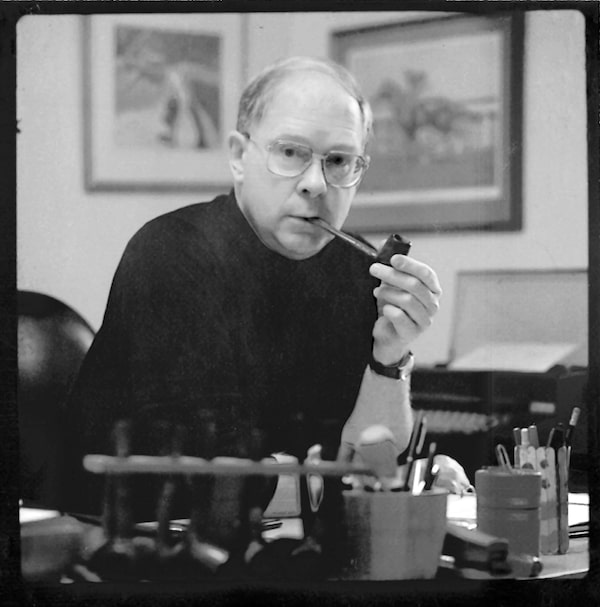
The RBC Taylor Prize for non fiction will be ending in 2020.Handout
The RBC Taylor Prize was established with a mandate and a mission – to firmly establish, in the hearts and minds of Canadian readers, the importance of literary non-fiction. With this successfully accomplished, the prize has now come to a close.
More than twenty-two years ago, my husband, Charles Taylor, edged closer to death. He broached the subject of creating a prize for the best book of non-fiction writing. He had been a celebrated foreign correspondent for this paper and had returned to Canada to continue his career in journalism, writing the kinds of books he thought Canadians needed to read.
RBC Taylor Prize announces end after 20 years of celebrating literary non-fiction
Over countless dinners, we talked about the importance of non-fiction writing as a major driver of civil discourse. Informed and enlightened Canadians, we believed, would bring about sound policy decisions and, through exposure to good non-fiction, would also develop the compassion they needed to make wise and caring decisions.
The social mission of literary non-fiction was undeniable, yet we noticed that non-fiction books often did not reach the same level of attention as novels. We were aware that there were considerably fewer books of non-fiction being published, and many of the non-fiction books were published by academic presses (and not intended for the general reader).
There was a clear need to change and enhance the perception for the best of what we called literary non-fiction: Books about real and factual subjects whose stories were so well-told that they would capture and maintain the interest of a general reader.
After Charles passed away, I became determined to honour his request and set about learning more about publishers and what was being published. I found people who were well-respected in the literary world, who were willing to help identify the goals of the prize and knew the vehicles needed for bringing the dream into reality. Robert Bringhurst brought his poetic vision, and David Staines brought his knowledge of both the publishing world and his extensive knowledge of the field of Canadian Literature. Charles’ sister, Judith Mappin, brought her experiences as a bookseller, and Michael Bradley turned his legal mind onto how to make things happen.
Together, we decided that the aim of the prize was to develop a spotlight on the world of non-fiction writing in Canada. Our goal was to recognize excellence in the genre in the hope that the Canadian reading public would pay attention – so much attention that the nature of what was being published and read would change. Interestingly, the framework we established for the Prize included benchmarks of anticipated achievement.
Twenty years later, change has occurred, and benchmarks achieved. To end the prize was not a funding decision. This was a decision of the Charles Taylor Foundation, informed by considerable reflection and discussion with our stakeholders including RBC and Prize staff members. Above all, we looked at the original mandate and benchmarks of the Prize and considered them in the context of the Canadian publishing landscape.
Initially, the prize was awarded every two years because there were not enough books being published in any one year that would qualify. This year, the jury for the 2020 RBC Taylor Prize will select a top book from amongst an astounding 155 entrants. Increasingly, publishers are giving over their prime “lead title” spots on the choice Fall lists to major non-fiction titles.
While the prize has always been about quality, it is wonderful to note that a winning author’s book was found on the bestseller list week after week after week. That was due, in part, to being identified as a winner by a panel of jurors that were esteemed within Canada and internationally. And, more excitingly, as the genre gained in popularity and respectability, younger writers were attracted to the field and its ability to address the issues that they thought we needed to read.
More than twenty years ago, I was asked why I wanted to start a prize such as this. “I want to do this to be able to talk to my neighbours. I want to understand the concerns of this country. I want to know about lives that are like mine and, above all, I want to know about lives that are different from mine. I want to read all these stories because I know that unless I do, I will never truly understand the complexities of this country.”
There is no question in my mind that all the books found on our years of shortlists and winners have influenced not only what people think about but, even more importantly, how they approach the diverse subjects addressed in these books.
After twenty years, I am confident that the RBC Taylor Prize has helped to change the perception of literary non-fiction in Canada, and that those changes are entrenched. I personally have been so thrilled to meet so many of the amazing writers we are fortunate enough to call our own – both on the page and sometimes in person. I trust that the writers who have found their audiences will continue to write books for them that will continue to astonish, enlighten, and entertain.
Expand your mind and build your reading list with the Books newsletter. Sign up today.